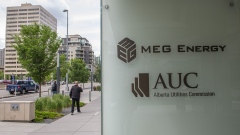Dec 22, 2022
Fast-Thawing China-Australia Ties Raise Hopes for Trade Easing
, Bloomberg News

(Bloomberg) -- Australian Foreign Minister Penny Wong’s visit to Beijing this week cemented a surprisingly fast thaw in diplomatic relations with China, although it remains to be seen whether the summit will result in a loosening of trade barriers thrown up during their recent feud.
Strolling through a frigid Beijing park on Wednesday, Wong responded to a reporter’s question on the state of ties by noting “the ice thaws but slowly.” Still, the fact she spoke those words ahead of a meeting in the Chinese capital highlights the changed atmosphere since the Labor government won office in May.
Her ministerial predecessors in Australia’s former conservative coalition government couldn’t get Chinese officials to take their calls, let alone meet for talks in Beijing. Wong’s visit was the first by a minister in almost four years, even as China remains Australia’s biggest trading partner.
Her visit, coming on the back of Xi Jinping’s first in-person summit with US President Joe Biden in Bali, Indonesia, last month, has led to speculation that the Chinese president is trying to repair ties with the West and move back to a lower-key diplomatic strategy.
Xi has also sought to improve links with leaders of top US allies, including Japanese premier Fumio Kishida and Australian leader Anthony Albanese.
Yun Jiang, China Matters Fellow at the Australian Institute of International Affairs, said she had been surprised at the speed of the rapprochement.
“When you see frozen relationships, it usually takes a while,” she said. “Even though there has been no change in government policy, the rhetoric has been toned down a lot.”
In the preceding six years, Australia and China’s relationship had gone from bad to worse as Beijing’s more assertive regional stance ran up against a more security-conscious Canberra that began restricting foreign investment and fretted about espionage.
As the relationship unraveled, two Australian citizens were arrested on spying charges in China — journalist Cheng Lei and writer Yang Hengjun — and Beijing imposed punitive trade actions on Australian commodities from coal to barley, lobsters and wine.
Former conservative Prime Minister Scott Morrison responded to the mounting tensions by cementing ties with the US through the AUKUS security pact that also includes the UK and the Quad security partnerships and sought to diversify Australia’s trade relationships away from China.
Wong’s trip to Beijing was ostensibly a celebration of 50 years of diplomatic relations between the two countries. She unveiled a commemorative envelope on Wednesday to mark the anniversary together with Foreign Minister Wang Yi.
In meetings afterwards, both parties agreed to new bilateral dialogs on diplomatic relations, consular affairs, trade and economic issues, climate change, defense, and regional and international issues.
Ahead of Labor’s victory in May, as the then opposition spokesperson, Wong had said she wanted to turn down the temperature of relations with Beijing. But overall, there had been little expectation of improved ties.
Morrison’s government had tried to make its tough stance a point of political difference with Labor, warning then-Opposition leader Anthony Albanese would be “weak” on China. It accused Deputy Labor leader Richard Marles of being a “Manchurian candidate” for having given speeches in Beijing.
Shortly after Labor’s victory, Albanese received a message of congratulations from Chinese Premier Li Keqiang. In November, the new Australian premier met with Chinese President Xi Jinping on the sidelines of the Group of 20 summit.
Yet many of the difficulties remain unresolved between the two countries.
Experts say any relaxation of the trade restrictions would likely be done unofficially at a later date. Both sides have taken their disputes to the World Trade Organization, which may take time to resolve, further stymieing efforts to restart trade
Wong is also still pressing for consular access for the two Australians held. Meanwhile there are no journalists for Australian media in China, after the final two fled the country in 2020 after being interrogated by the Ministry of State Security after Australian security officials raided the homes of Chinese state media journalists.
Jiang said clashes over foreign investment by Chinese companies in Australia is also likely to test the new consensus. Treasurer Jim Chalmers has already flagged restrictions on international funding for critical minerals projects.
Jennifer Hsu, project director at the Lowy Institute, said there has also been no sign from Australia that it would be willing to compromise on security and human rights.
She said even though ties had been normalized, it’s unlikely Australia and China will return to the diplomatic footing prior to the downward spiral.
“The world has changed,” Hsu said. “I don’t think Australia-China relations will go back to where it was five, six years ago.”
--With assistance from James Mayger.
©2022 Bloomberg L.P.








